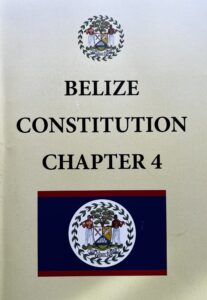By Dylan Vernon, (REAL STORY#5, 1 November 2023)
 Whereas the people of Belize — affirm that the Nation of Belize shall be founded upon principles which…[the people of Belize] desire that their society shall reflect and enjoy the above-mentioned principles, beliefs and needs and that their Constitution should therefore enshrine and make provisions for ensuring the achievement for the same in Belize. (Excerpt, Preamble, Constitution of Belize).
Whereas the people of Belize — affirm that the Nation of Belize shall be founded upon principles which…[the people of Belize] desire that their society shall reflect and enjoy the above-mentioned principles, beliefs and needs and that their Constitution should therefore enshrine and make provisions for ensuring the achievement for the same in Belize. (Excerpt, Preamble, Constitution of Belize).
As this last paragraph (f) of the Preamble makes abundantly clear, the Preamble is the corner stone of the wider national foundation that is the Independence Constitution of Belize. Indeed, it has been argued that, in 1981, the Belize Preamble was the most progressive and unique innovation coming out of the short process of drafting the Constitution.
Preambles in constitutions across the globe come in different shapes, sizes and intent; but they are generally approached as immensely important national declarations that can include statements of historical origins, identity, language, overarching values, principles, national goals, rights and freedoms, responsibilities of state and citizens, and even policy roadmaps. Yet, there are diverse opinions, practices and judicial desicions among states on whether or to what extent preambles are obligatory and legally-binding — or just simply aspirational declarations.… Read the rest...

 “Well, you better listen my sisters and brothers
“Well, you better listen my sisters and brothers As one of the citizens who signed the Oceana Belize petition, I welcome the passage of the Bill by the House of Representatives on 13 October 2023 to amend the Referendum Act. When passed by the Senate, the amendment will ensure that Belizeans are consulted by referendum before any move to change or repeal the moratorium placed on offshore oil and natural gas exploration and petroleum operations. Recalling that the original referendum petition called for a constitutional amendment to require a referendum for changing the offshore moratorium, it is a good time to start a national discussion on environmental rights in the Belize Constitution.
As one of the citizens who signed the Oceana Belize petition, I welcome the passage of the Bill by the House of Representatives on 13 October 2023 to amend the Referendum Act. When passed by the Senate, the amendment will ensure that Belizeans are consulted by referendum before any move to change or repeal the moratorium placed on offshore oil and natural gas exploration and petroleum operations. Recalling that the original referendum petition called for a constitutional amendment to require a referendum for changing the offshore moratorium, it is a good time to start a national discussion on environmental rights in the Belize Constitution.  So, were the people of Belize consulted on the first full draft or any other draft of their own Independence Constitution? Some certainly advocated to be consulted. Given that there were no public consultations on the
So, were the people of Belize consulted on the first full draft or any other draft of their own Independence Constitution? Some certainly advocated to be consulted. Given that there were no public consultations on the  On Saturday 4th April 1981, a small Belizean government delegation boarded a flight at the Belize International Airport to begin a long journey to London to ‘negotiate’ Belize’s Independence Constitution with the British. This was just over one week after the National Assembly approved the Report of the Joint Select Committee on the White Paper on 27 March 1981.
On Saturday 4th April 1981, a small Belizean government delegation boarded a flight at the Belize International Airport to begin a long journey to London to ‘negotiate’ Belize’s Independence Constitution with the British. This was just over one week after the National Assembly approved the Report of the Joint Select Committee on the White Paper on 27 March 1981.